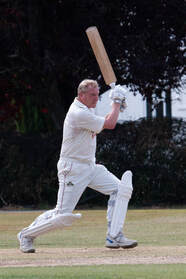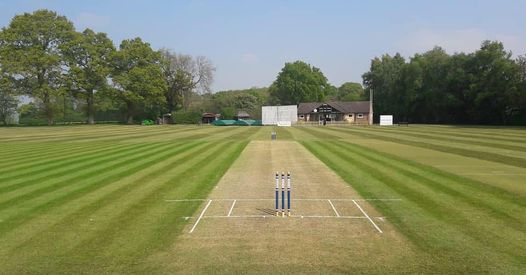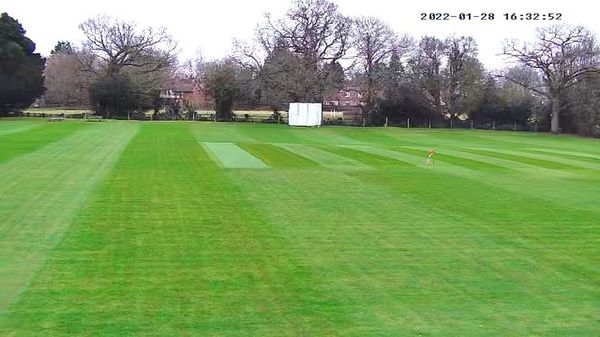 Andy Worth
Andy Worth Sparsholt, on the outskirts of Winchester, is situated overlooking one of the most picturesque villages in Hampshire. But regardless of the aesthetic beauty of the club’s Norman Edwards Ground, they have and continue to face challenges as the sport looks to rebuild after the pandemic.
Not least, only having one match day ground, which naturally limits any ambition to take the club to the next level, both on the pitch and off it, writes Richard Edwards in the February 2022 CCC newsletter.
“With just the one ground, you can obviously only have two teams playing at your ground on a Saturday,” says Andy Worth, the Sparsholt chairman. “You can only have the first and second team using your ground. Yes, the third team play at a very nice spot but it’s not at Sparsholt Cricket Club. Apart from going to training, the players outside the first and second team don’t have to ever turn up at the cricket club.
“We’ve been very lucky to move from a council pitch to the John Lewis Estate (at nearby Leckford) but anyone who does play on a council pitch is struggling because councils are cutting back and they’re not putting a lot of time into recreational cricket pitches. The pandemic is only going to exacerbate that, with more and more cut-backs likely.”
Off the pitch, the pandemic has provided many clubs with an unforeseen, and certainly unbudgeted for, financial windfall that no-one saw coming in late 2019 and early 2020.
As a rateable organisation, Sparsholt, like so many other teams, were able to get the kind of funding that was previously unavailable.
Wages
“We were quite lucky in that any rateable business or sports club received a grant of ten grand for all club with a bar and their own clubhouse, says Worth. “To us that’s a huge amount of cash. To others, it wouldn’t even pay the wages of the staff that they employ. We’re just on the right side, in terms of size, to have benefited from that.
“Anecdotally, there’s one local club that generally runs off £500 a year, that suddenly has so much money that they don’t know what to do with it all. They’ve never had so much. From our point of view, we got more from the government for being a community and sports club than we did from the ECB.”
English cricket’s governing body has had its fair share of plaudits for its handling of the crisis. It has also come in for some fierce criticism, with some believing that their relentless focus on England’s fortunes – and the areas of the game which generate the most income – has come at the expense of the grassroots of the sport.
Worth adds his voice to that viewpoint.
“My own personal view is that club cricket is most certainly not a priority for them, I don’t think it ever has been and I think they pay lip service to it,” he says. “The ECB give the impression that their priority is England and then the counties, but I don’t think they pay them too much attention either.
Instrumental
While the last two years could easily have torn the sport apart, there are some excellent examples of how the pandemic has brought clubs and the communities they operate in, closer together.
For his part, Worth believes the lack of cricket in 2020 and, to a lesser extent, 2021, has been instrumental in bringing a lot of people back into the sport.
“There was so much availability towards the end of the Covid season by virtue of the fact that people weren’t going away on holiday,” he says. “I also think that social media groups on platforms like Facebook are good at getting clubs closer together and getting them communicating more than perhaps they would have done in the past.
“You can have discussions with people about grounds, about pitch preparation etc. There are a lot of opinions out there and a lot of different ways of contacting people that weren’t open to you before.
“Whether that’s down to Covid or whether that’s simply down to the accessibility of different opinions, I’m not sure.”
Live streaming
Sparsholt themselves are looking to increase their live streaming of matches via YouTube. The first team scorer will live stream the club’s matches this season with the PlayCricket score also viewable. This is a significant widening of their current offering, although there could be issues around the cost of paying for an associated licence – a cost that for some clubs of Sparsholt’s size will be prohibitive.
“The company that are working with the ECB on this are charging £500 for the licence,” says Worth. “It’s a great idea, but suddenly something which we thought was going to be available for free, is going to cost quite a sizeable amount, which means we might have to think again about it.”
Away from the technology, it’s the usual concerns over availability and a reluctance from some of the younger generation to commit to playing cricket week-on-week.
The great thing as we move into 2022, though, is that many of the concerns that have dogged clubs like Sparsholt for the past two years are no longer there.
In this corner of the south coast, there’s a real sense that normality is about to return. Regardless of the bank balance, that’s as good a reason as any to celebrate. Member Grounds
Richard Edwards (not the Sparsholt one !)
Not least, only having one match day ground, which naturally limits any ambition to take the club to the next level, both on the pitch and off it, writes Richard Edwards in the February 2022 CCC newsletter.
“With just the one ground, you can obviously only have two teams playing at your ground on a Saturday,” says Andy Worth, the Sparsholt chairman. “You can only have the first and second team using your ground. Yes, the third team play at a very nice spot but it’s not at Sparsholt Cricket Club. Apart from going to training, the players outside the first and second team don’t have to ever turn up at the cricket club.
“We’ve been very lucky to move from a council pitch to the John Lewis Estate (at nearby Leckford) but anyone who does play on a council pitch is struggling because councils are cutting back and they’re not putting a lot of time into recreational cricket pitches. The pandemic is only going to exacerbate that, with more and more cut-backs likely.”
Off the pitch, the pandemic has provided many clubs with an unforeseen, and certainly unbudgeted for, financial windfall that no-one saw coming in late 2019 and early 2020.
As a rateable organisation, Sparsholt, like so many other teams, were able to get the kind of funding that was previously unavailable.
Wages
“We were quite lucky in that any rateable business or sports club received a grant of ten grand for all club with a bar and their own clubhouse, says Worth. “To us that’s a huge amount of cash. To others, it wouldn’t even pay the wages of the staff that they employ. We’re just on the right side, in terms of size, to have benefited from that.
“Anecdotally, there’s one local club that generally runs off £500 a year, that suddenly has so much money that they don’t know what to do with it all. They’ve never had so much. From our point of view, we got more from the government for being a community and sports club than we did from the ECB.”
English cricket’s governing body has had its fair share of plaudits for its handling of the crisis. It has also come in for some fierce criticism, with some believing that their relentless focus on England’s fortunes – and the areas of the game which generate the most income – has come at the expense of the grassroots of the sport.
Worth adds his voice to that viewpoint.
“My own personal view is that club cricket is most certainly not a priority for them, I don’t think it ever has been and I think they pay lip service to it,” he says. “The ECB give the impression that their priority is England and then the counties, but I don’t think they pay them too much attention either.
Instrumental
While the last two years could easily have torn the sport apart, there are some excellent examples of how the pandemic has brought clubs and the communities they operate in, closer together.
For his part, Worth believes the lack of cricket in 2020 and, to a lesser extent, 2021, has been instrumental in bringing a lot of people back into the sport.
“There was so much availability towards the end of the Covid season by virtue of the fact that people weren’t going away on holiday,” he says. “I also think that social media groups on platforms like Facebook are good at getting clubs closer together and getting them communicating more than perhaps they would have done in the past.
“You can have discussions with people about grounds, about pitch preparation etc. There are a lot of opinions out there and a lot of different ways of contacting people that weren’t open to you before.
“Whether that’s down to Covid or whether that’s simply down to the accessibility of different opinions, I’m not sure.”
Live streaming
Sparsholt themselves are looking to increase their live streaming of matches via YouTube. The first team scorer will live stream the club’s matches this season with the PlayCricket score also viewable. This is a significant widening of their current offering, although there could be issues around the cost of paying for an associated licence – a cost that for some clubs of Sparsholt’s size will be prohibitive.
“The company that are working with the ECB on this are charging £500 for the licence,” says Worth. “It’s a great idea, but suddenly something which we thought was going to be available for free, is going to cost quite a sizeable amount, which means we might have to think again about it.”
Away from the technology, it’s the usual concerns over availability and a reluctance from some of the younger generation to commit to playing cricket week-on-week.
The great thing as we move into 2022, though, is that many of the concerns that have dogged clubs like Sparsholt for the past two years are no longer there.
In this corner of the south coast, there’s a real sense that normality is about to return. Regardless of the bank balance, that’s as good a reason as any to celebrate. Member Grounds
Richard Edwards (not the Sparsholt one !)




